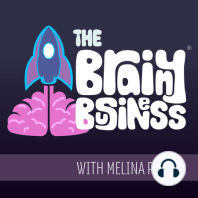59 min listen

93. Normalcy Bias: Why We Love To Know What’s Coming And How It Keeps Us Stuck (a Behavioral Economics Foundations Episode)
FromThe Brainy Business | Understanding the Psychology of Why People Buy | Behavioral Economics
93. Normalcy Bias: Why We Love To Know What’s Coming And How It Keeps Us Stuck (a Behavioral Economics Foundations Episode)
FromThe Brainy Business | Understanding the Psychology of Why People Buy | Behavioral Economics
ratings:
Length:
19 minutes
Released:
Mar 27, 2020
Format:
Podcast episode
Description
Have you ever wondered why it's blindly accepted to just do things the same way they’ve always been done? Have you noticed how a new business can completely disrupt an industry by doing things totally different? Sometimes they put established companies out of business, even though the original business could have implemented the same strategies before the disruptor. A big reason this happens is normalcy bias. Normalcy bias is where the brain believes that everything will be normal and waits for things to be normal again in a time of crisis. This principle not only applies to business, but it very much applies to some of the reasons many people weren't prepared for the coronavirus pandemic even though it had been on the news weeks before the shutdown. This normalcy bias episode is directly influenced by episode 91. Coronavirus and How the Human Brain Responds to Pandemics. If you have not yet listened to that episode…I highly recommend it. There is so much going on right now with new announcements every day of countries taking new and very important precautions to stop the spread of this disease. That episode talks about why the brain is wired to react the way it does during a novel and frightening situation like this, and why we all feel inclined to hoard lots of supplies like toilet paper even when we know that is a bit irrational. Normalcy bias is very much tied in with the situation we all find ourselves in as coronavirus is changing our entire world. It is also a bias that you can overcome to benefit your business. It’s also something we are talking about in the BE Thoughtful Revolution. If you’re interested in joining the BE Thoughtful Revolution, you can get a 7 day free trial and a 50% discount using the code HALFOFF through March 31, 2020. Show Notes: [03:39] Normalcy bias is the tendency for the brain to believe that everything will be normal – and to wait for things to be normal again in times of crisis or change. This impacts both sides of change. [04:20] It's easy to assume that things will stay the same and remain normal. This combines with availability bias and time discounting. [05:09] We have a hard time preparing for something before it happens. [05:48] Disruptors are able to infiltrate because those in the industry are too close, and their normalcy bias is telling them that things will always be the same. [06:09] Disruptors can see things differently, because they aren't subject to the same constraints of the brain. [07:29] Progressive’s head of marketing “fires himself” every 12 to 18 months to reset as if he just got hired. [10:03] Normalcy bias makes it so we all don’t properly prepare for or anticipate a big change. The other side of this, is that once change is thrust upon us, while we are in the midst of it…we cling to “normal” more than ever. [10:28] The brain grieves for what used to be, what it was used to, and its inclination is to ride out the storm until things are normal again. [11:12] Our brains love the status quo and what they are used to. [12:02] An example of the finance industry, status quo, and Apple Card. [14:29] The desire to wait and see…to weather the storm when you are in the midst of change…is normalcy bias keeping you stuck. If you aren’t careful, it can cause you to miss the boat and your business could be in serious trouble. [15:47] My brain is constantly wanting to say that this is a temporary setback. I can’t rely on that being the case. My business model needs to adapt to the possibility that there may only be a few conferences in the coming months. [16:44] This is the time to look at other opportunities: what can be done virtually? [17:33] I also need to make sure that I am investing time and energy into what is the best fit for the market. What do people want, and need and where does that coincide with my expertise? [18:29] Having too much reliance on any particular product line, client, or type of service is always something that should be reviewed. [19:07] If you are
Released:
Mar 27, 2020
Format:
Podcast episode
Titles in the series (100)
19. Herding: Come On And Listen…Everyone Else Is Doing It: Herding is the topic of today’s behavioral economics podcast foundations episode. This concept is similar to the way animals herd and for many of the same reasons. For safety, being in the center of the herd offers protection from predators. There... by The Brainy Business | Understanding the Psychology of Why People Buy | Behavioral Economics